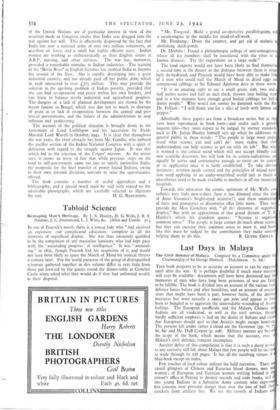Tabloid Science
Reshaping Man's Heritage. By J. S. Huxley, H. G. Wells, J. B. S Haldane, J. C. Drummond, L. J. Witts, &c. (Allen and Unwin. 5s.)
IN one of Peacock's novels there is a young lady who "had received an expensive end complicated education: complete in all the elements of superficial display. She was thus eminently qualified to be the companion of any masculine luminary who had kept pace with the 'astounding progress' of intelligence." It was " astound- ing " in 1831, though Peacock had his suspicions of it, and would not have been likely to spare the March of Mind his ironical thrusts a century later. For the world panaceas of the group of distinguished scientists gathered together in this volume differ in very little from those put forward by the guests round the dinner-table at Crotchet Castle when asked what they would do if they had unlimited wealth at their disposal.
"Mr. Toogood: Build a grand co-operative parallelogram, wi a steam-engine in the middle for maid-of-all-work.
Mr. Firedamp : Drain the country, and get rid of malaria abolishing duck-ponds.
Dr. Morbific: Found a philanthropic college of anti-contagionis where all the members shall be inoculated with the virus of known diseases. Try the experiment on a large scale."
The food experts would not have been likely to find themselva a second time at the dinner as the dialogue between them is sing larly de-hydrated, and Peacock would have been able to make li of a man who could hail the March of Mind in dried eggs and compressed cabbage as Sir Edward Appleton does in these words:
"It is an amazing sight to see a small green slab, two and half inches across and half an inch thick, thrown into boiling wat and in a few minutes have enough good boiled cabbage for half dozen people." Who would not sooner be dammed with the Rev. Dr. Folliott : "I will thank you for a slice of lamb with lemon an pepper."
Admittedly these papers are from a broadcast series, but as the have been reproduced in book form—and under such a grand loquent title—they must expect to be judged by sterner standards such as Dr. Julian Huxley himself sets up when he addresses the general public in these words : "The people at large must uncle stand what science can and can't do : must realise that Mei understanding can help science to get on with its job." But wh is wanted is the critical mind which will not accept blindly ea new scientific discovery, but will look for its contra-indications, and equally be active and constructive enough to insist on its control or its application once it is fairly established. To take obvioui instances : aviation needs control and the principles of sound nutn- tion need applying to an under-nourished world just as much ai anaesthetics need to be made available to mothers in all our municipal hospitals.
Towards this education the cosmic optimism of Mr. Wells con tributes very little now-a-days (how it has dimmed since the dal of Anne Veronica's bright-eyed scientist!), and these smattering of facts and panegyrics of discoveries offer little more. They ma, provide the Miss Crotchets with "all the elements of superfica: display," but with no appreciation of that grand dictum of T. H Huxley's which his grandson quotes : "Science is organis. common sense." The people at large cannot do much about scienc:. but they can exercise their common sense to meet it, and book, like this must be judged by the contribution they make towardi






















 Previous page
Previous page